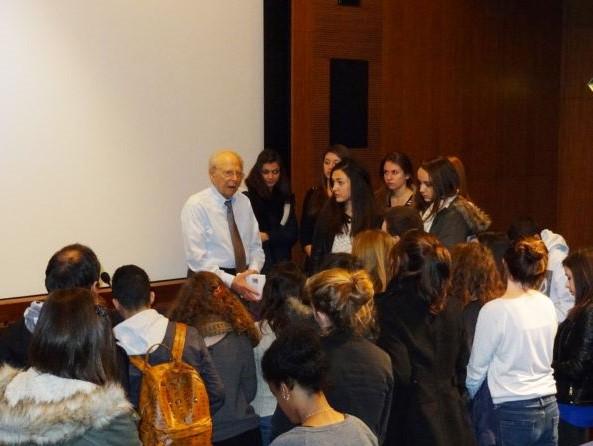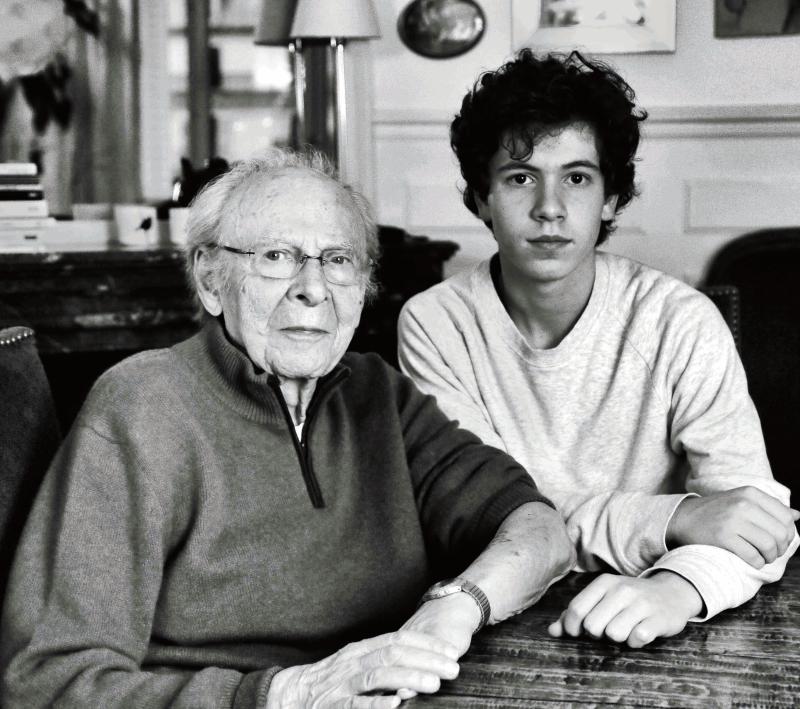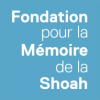La Fondation | Hommages
Death of Henri Borlant
It was with great sadness that we learned of the death of Henri Borlant, on December 3, 2024, in his 98th year. Born in Paris in 1927 to a family from Russia, he was evacuated to Maine-et-Loire in 1939. Deported to Auschwitz-Birkenau by convoy no. 8, which left Angers on July 20, 1942, with his father and an older brother and sister, he was the only one to return. He was reunited with his mother and siblings, who had been hidden by the Righteous. After becoming a doctor, shocked by the Touvier trial in 1994, he never stopped bearing witness. We send our deepest condolences to his wife and family.
Born in Paris on June 5, 1927, Henri Borlant was the fourth child of a modest couple, Russian-speaking Jews from the Odessa region for the father and from Kishinev in Bessarabia for the mother's family. They first live in the 18ᵉ arrondissement, then obtain HBM housing in the 13ᵉ arrondissement, rue Château-des-Rentiers when the family expands (there will be 9 children). Father Aron works as a home tailor, while mother Rachel helps out. In 1939, when war was declared, the family was evacuated to Maine-et-Loire like many large families in the 13ᵉ.
In July 1942, Henri, who had just turned 15, was arrested along with his father, his 17-year-old brother Bernard and his 21-year-old sister Denise. They were deported by convoy no. 8, which left Angers on July 20, 1942 with 879 Jews rounded up from all over western France. Of the 77 convoys that left France, this was the only one that did not go to Drancy, but directly to Auschwitz-Birkenau. Supported by his brother in his early days in Birkenau, when he quickly caught typhus, he was then sent to Auschwitz I for a year. When he returned to Birkenau, he learned that his father and brother were dead. Despite the cold, hunger and inhuman treatment he would later recount, he clung to life, learning Yiddish and German, and finding comfort in the camp's French people, including two doctors from his convoy.
At the end of October 1944, he was evacuated to central Germany: first to Oranienburg, then to Ohrdruf, a Buchenwald satellite camp. As the camp was about to be evacuated in the face of the advancing Americans, he escaped with some friends. Eventually, he was repatriated to France and reunited with his mother and five younger brothers and sisters, who had survived in Maine-et-Loire thanks to the help of the mayor and local residents, and who were subsequently recognized as Righteous Among the Nations. Her elder brother Léon, a soldier and later a member of the Resistance, also survived. His maternal grandparents, on the other hand, were deported and murdered at Auschwitz-Birkenau, as was his aunt Fanny Beznos, a member of the Resistance. He has to tell his mother that her husband and two of her children are not coming back, but doesn't remember the circumstances of this announcement.
In the immediate post-war period of rationing, material life for a large family without a father is difficult, but Henri has developed his resourcefulness and knows how to use social services to make the most of his status as a war victim. Encouraged by the doctor Désiré Hafner, with whom he had remained close since their deportation, he resumed his studies, which had stopped at the Certificat d'Etudes. In two and a half years, he skipped stages and managed to pass his baccalaureate and enter medical school. Despite contracting pulmonary tuberculosis during the deportation, which led to several sanatorium stays, in 1956 he obtained his medical diploma and in 1958 set up as a general practitioner in the 11ᵉ arrondissement in Paris. He married Hella, a young German woman, fiercely anti-Nazi, who came to help him in his practice.

Henri Borlant testifying to students from the Lycée Henri Bergson in Angers at the Shoah Memorial in Paris in 2010.
Henri Borlant remained very close to his deportation friends Jacques Altmann and Adolf Bekas, with whom he was able to evoke their memories, but he realized as soon as he returned from the camps that the word of the deportees was very difficult to hear, especially for their relatives.
In 1974, however, he suffered a relapse of tuberculosis, followed by a nervous breakdown. He then began psychoanalysis. As he explains in his testimony “Merci d'avoir survécu”, published by Seuil in 2011, based on a note slipped to him by a pupil who had heard him testify, it was the Touvier ruling in 1994, exonerating the Vichy regime of its responsibilities in the persecution of the Jews of France, that decided him to testify, which he did without interruption until his death.
He was also a member of the Memory and Transmission Commission of the Fondation pour la Mémoire de la Shoah from 2007 to 2019, and a member of the reading committee of the collection Témoignages de la Shoah from 2009 to the present.
Henri Borlant had four daughters.

Cover photo: Henri Borlant, deported at the age of 15, and Salomon Manns, 15, photographed by Karine Sicard Bouvatier for her book Déportés. Leur ultime transmission, Éditions de La Martinière, April 2021.
This photo was used on the cover of our 2020 Annual Report.
Publié le 05/11/2025






